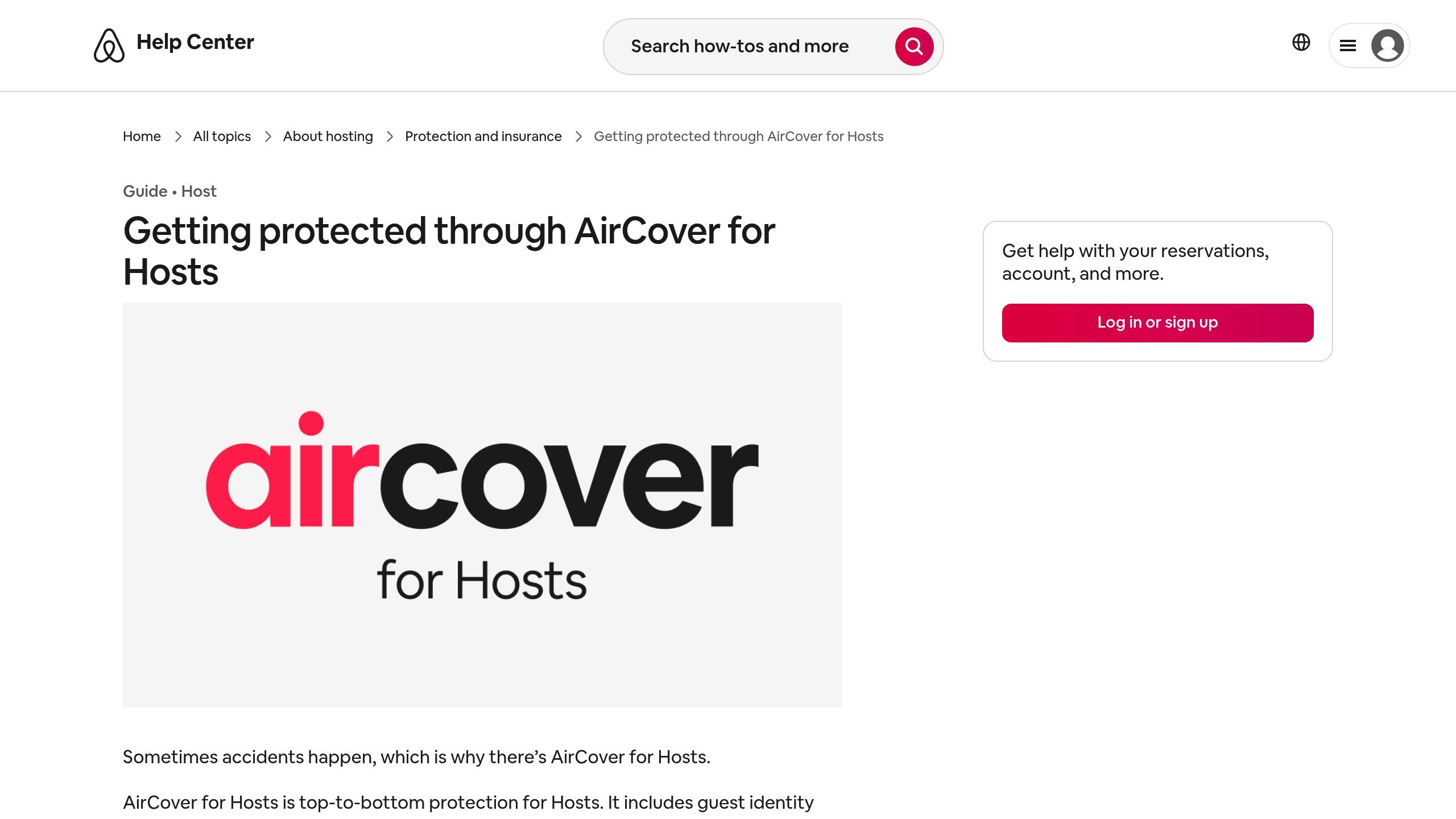Short-term rental insurance is essential for protecting your property, income, and guests from risks standard home insurance doesn’t cover. Here’s what you need to know:
- Why It’s Needed: Standard home insurance excludes business-related risks like guest damage or injuries. Short-term rental insurance fills these gaps.
- Key Coverage Types:
- Guest Damage: Covers accidental or intentional property damage.
- Guest Injury Protection: Includes medical expenses and legal fees for injuries.
- Income Protection: Secures rental income during disruptions like repairs.
- Local Risks in Nova Scotia: Seasonal tourism, unpredictable weather, and compliance with rental laws make tailored insurance crucial.
- How to Choose a Provider:
- Look for companies specializing in short-term rentals.
- Review coverage limits, exclusions, and claims processes.
- Consider working with an insurance broker for guidance.
| Coverage Type | Standard Home Insurance | Short-Term Rental Insurance |
|---|---|---|
| Guest Damage | Usually excluded | Covered |
| Business Income | Not covered | Insured |
| Guest Injuries | Limited coverage | Comprehensive protection |
| Property Misuse | Excluded | Included |
To comply with Nova Scotia regulations and protect your investment, ensure your policy explicitly includes short-term rental activities. Start by calculating your coverage needs, gathering quotes, and selecting a policy that aligns with local requirements.
Vacation Rental Insurance 101 - AirCover is NOT enough!

Main Insurance Coverage Types
When it comes to protecting your short-term rental property in Nova Scotia, three key types of insurance coverage are essential. These address risks tied to local hazards and incidents involving guests.
Guest Damage Coverage
This type of coverage safeguards your property against damage caused by renters, whether accidental or intentional. It goes beyond standard policies to cover:
- Damage to walls, floors, and fixtures
- Harm to furniture and appliances
- Theft or loss of personal property
- Acts of vandalism
Make sure your policy reflects the full value of your property and its contents.
Next, liability coverage ensures you're prepared for guest-related injuries.
Guest Injury Protection
Nova Scotia's winters can increase the chances of slip-and-fall accidents, making liability coverage a must-have. This protection typically includes:
- Coverage for medical expenses
- Legal defense fees
- Settlement costs
- Emergency medical transport
Policies are often designed with short-term rental risks in mind, offering tailored solutions.
Income protection is another critical layer to safeguard your revenue stream.
Income Protection
Income protection coverage ensures your rental income remains secure when unexpected events disrupt your ability to host guests. For example, a case study showed short-term rentals generating $127,400 in net income compared to $60,000 for long-term rentals [1].
"My income used to fluctuate unpredictably. With Casa Scotia, my bookings and earnings are steady and reliable." - Alex M. [1]
This coverage may include:
- Compensation for lost income during repairs
- Reimbursement for cancellations caused by property damage
- Business interruption expenses
- Costs for arranging alternative accommodations
To get the most out of this coverage, choose a policy that accounts for your property's peak earning potential.
Choosing Insurance Providers and Plans
Finding suitable insurance for your short-term rental in Nova Scotia means working with providers who understand the unique risks of your market.
Finding Local Insurance Companies
Begin by looking for insurance companies that specialize in short-term rental coverage. Focus on providers experienced with vacation rental and Airbnb-related claims. When evaluating your options, consider the following:
- Specialization in short-term rentals
- Proven claims handling experience
- Strong financial stability
- High-quality customer service
Reading Policy Terms
Pay close attention to these key aspects of any policy:
- Coverage limits: Ensure they align with your property’s value and potential liability risks.
- Deductibles: Compare options to find the right balance between premiums and out-of-pocket costs.
- Exclusions: Identify any areas the policy does not cover.
- Claims process: Learn what documentation is needed and how claims are handled.
- Premium payment options: Decide if monthly or annual payments work better for you.
| Policy Element | What to Check |
|---|---|
| Coverage Activation | When coverage starts relative to guest check-in |
| Claim Response Time | How quickly claims are processed |
| Coverage Territory | Specific areas in Nova Scotia the policy applies to |
| Policy Renewal | Terms for renewing your policy |
After reviewing policies, consider working with an insurance broker to simplify your decision-making process.
Benefits of Insurance Brokers
Property management companies like Casa Scotia can assist with navigating insurance needs. They provide robust insurance solutions for the properties they manage and guide owners through the complexities of short-term rental insurance.
An insurance broker can make the process easier by offering:
- Access to multiple insurance providers
- Insights into market trends
- Help comparing policies
- Support during the claims process
- Regular reviews to keep your coverage up-to-date
Brokers not only help you avoid coverage gaps but also ensure you’re not overpaying for unnecessary protection. They can explain how various policies work together to give you complete coverage for your rental property.
sbb-itb-b5e1074
Meeting Local Rules and Requirements
If you're a short-term rental owner in Nova Scotia, you're required to have the right insurance in place. Here's a breakdown of the local rules and the types of insurance you'll need to meet them.
Halifax and Nova Scotia Rental Laws
Operating a short-term rental in Nova Scotia means adhering to specific regulations, which can directly influence your insurance requirements:
| Requirement Type | Description | Impact on Insurance |
|---|---|---|
| Property Safety | Routine safety checks and maintenance | May require higher coverage limits |
| Guest Screening | Screening guests is mandatory | Can affect liability coverage terms |
| Property Access | Emergency exits and safety equipment must be clear | Impacts property insurance rates |
| Documentation | Permits and licenses must be valid | Essential for insurance to remain valid |
Required Short-Term Rental Insurance Coverage
To protect your property and comply with the law, you'll need specific insurance types: commercial general liability, building coverage, contents insurance, and business interruption coverage. It's crucial that your policy explicitly includes short-term rental activities, as standard homeowner's insurance won't cover these operations.
Casa Scotia's Compliance Services

Casa Scotia simplifies the process of staying compliant for short-term rental owners. They offer services such as:
- Regular property inspections to ensure safety standards.
- Managing documentation to streamline insurance claims.
- Setting up guest screening protocols.
- Establishing and enforcing house rules.
"Casa Scotia turned my anxiety into reassurance - my home stays immaculate, and my worries vanished." – Emily G.
With their strong connections to insurance providers and in-depth knowledge of compliance, Casa Scotia helps property owners secure the coverage they need. Up next, we’ll guide you through a simple 5-step process to choose the right insurance policy.
5 Steps to Buy Rental Insurance
Calculate Coverage Needs
Start by figuring out exactly what kind of coverage your Halifax or Nova Scotia short-term rental requires. Focus on three main areas:
| Coverage Area | What to Consider | How to Assess |
|---|---|---|
| Property Value | Building costs, furnishings, upgrades | Get a professional appraisal |
| Income Protection | Monthly revenue, peak seasons | Review last year's earnings |
| Liability Coverage | Guest capacity, amenities, location risks | Identify potential risk factors |
Take note of your property's unique features and risks. Think about things like local weather, proximity to the coast, and seasonal trends that could impact your insurance needs. Once you have a clear picture, you're ready to move on to gathering quotes.
Get Insurance Quotes
Now that you know what coverage you need, it's time to shop around for the best options. Here's how:
- Reach Out to Multiple Providers
Start by contacting local Nova Scotia insurance companies. Make sure to request quotes specifically tailored to short-term rental properties. - Compare Coverage Details
Look at the deductible amounts, coverage limits, inclusions and exclusions, and whether you might need any additional riders. - Check Provider Reputation
Research how quickly they process claims, their customer service ratings, financial stability, and whether they have a strong local presence in the Nova Scotia area.
Select Your Policy
When choosing a policy, make sure it meets both your needs and Nova Scotia's rental regulations. Focus on these key features:
| Policy Feature | Why It’s Important | What to Look For |
|---|---|---|
| Claims Process | Speeds up recovery after incidents | 24/7 support and local adjusters |
| Payment Terms | Helps manage your cash flow | Monthly or annual payment options |
| Coverage Limits | Protects your investment | Matches your property's value |
| Policy Updates | Keeps you compliant | Automatic updates for regulations |
For added peace of mind, consult with local experts to ensure your coverage aligns with regional rules and requirements.
Conclusion: Securing Your Rental Property
Key Takeaways
To protect your rental property, it's important to have insurance that addresses guest damage, income loss, and property protection. Here's a quick breakdown:
| Coverage Type | What to Consider | Why It Matters |
|---|---|---|
| Guest Protection | Covers damage and injuries | Helps avoid expensive claims |
| Income Security | Protects rental income | Keeps your earnings safe |
| Property Coverage | Includes building and contents | Safeguards your physical assets |
| Compliance | Meets local regulations | Ensures you're operating legally |
These components are essential to keeping your investment secure. With this in mind, here’s what you should do next.
Next Steps
Take action today:
- Check your current coverage: Look for any gaps that might leave you vulnerable.
- Reach out to local experts: Contact insurance providers who specialize in short-term rental policies.
If you need additional guidance, consider working with a reliable property management service.
"I never imagined making this much from my property without lifting a finger. Casa Scotia made everything simple - my income doubled, and stress vanished completely." - Laura M.
Related Blog Posts
- Short term rental regulation in HRM ( Halifax, Bedford, Dartmouth )
- Short-Term Rental Regulations in Nova Scotia: Yarmouth & Acadian Shores (Yarmouth, Clare, Digby)
- Short-Term Rental Regulations in Nova Scotia: Parrsboro & Bay of Fundy Region
- Short-Term Rental Regulations in Nova Scotia: Northumberland Shore (Tatamagouche, Pugwash)



